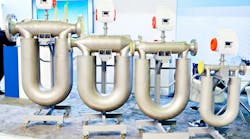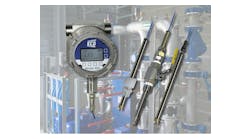After realizing the extent of Georgia’s water crisis last year, the management at WIKA Instrument Corporation (www.wika.com) decided it wanted to do its part in being a good corporate citizen by initiating a water reduction project.
To carry out the project, a team was formed consisting of Erich Berninger, director of manufacturing; Cathy Bochenek, environmental health and safety manager; and Peter Braun, facility manager.
Bochenek commented that the company implemented the water reduction project to be proactive and to see what it could do to alleviate the water crisis.
"To create a starting point for the project our team looked at WIKA’s big water usages and ways we could reduce or eliminate water usages," said Bochenek.
The team looked at everything from extending vacation time, collecting rain water to underground tanks and well drilling. According to Bochenek, Wika eventually settled on adding chillers to some of its machinery.
"We ultimately went with the least expensive option that would have the fastest outcome," said Bochenek. "Through research, we discovered that adding chillers at different operations would have a return on investment in less than a year."
WIKA’s Facility Manager, Peter Braun, said WIKA does a lot of soldering, which requires a lot of water. Installing chillers in the soldering process enables it to circulate and reuse water, and because it is a closed system, water evaporation is eliminated as well.
"We decided to benchmark our project this past June. We looked at our June water billing statement and compared it to last year. The results were tremendous," said Bochenek. "Last year at this time we peaked at 60,300 gallons of water per workday. June’s statement showed that we used less than 18,500 gallons per workday, which is almost a 70 percent reduction!"
Along with increased production, the water reduction project has also helped to increase awareness with WIKA employees. "This project has shown our employees, and hopefully the community too, that we all have to do our part in helping to reduce water usages," said Braun. "By seeing the efforts the company is making to reduce water usages, our employees see that WIKA cares about them and the environment."
Braun concluded by encouraging other companies in the community to look at ways they can reduce their water usage. "We realized that we all needed to do our part and we could not have been happier with the results of our water reduction project," he said. "The payback has been great and it has allowed our company to be a good corporate citizen."
The above article was written by Delaine S. Gray, communications manager for the Gwinnett Chamber of Commerce (Georgia, www.gwinnettchamber.org) for its August 2008 FOCUS newsletter.
Continue Reading
Continue Reading

